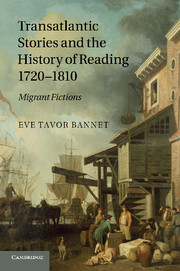Book contents
- Frontmatter
- Contents
- List of illustration
- Acknowledgments
- Introduction: Transatlantic stories and Transatlantic readers
- PART I “POOR MAN'S COUNTRY”
- 1 Strange adventures
- 2 Captivity and antislavery
- 3 The parallel Atlantic economy
- 4 Fortune's footballs
- PART II THE SERVANT'S TALE
- PART III PRINTSCAPES
- Afterword
- Notes
- Works cited
- Index
2 - Captivity and antislavery
Published online by Cambridge University Press: 05 July 2011
- Frontmatter
- Contents
- List of illustration
- Acknowledgments
- Introduction: Transatlantic stories and Transatlantic readers
- PART I “POOR MAN'S COUNTRY”
- 1 Strange adventures
- 2 Captivity and antislavery
- 3 The parallel Atlantic economy
- 4 Fortune's footballs
- PART II THE SERVANT'S TALE
- PART III PRINTSCAPES
- Afterword
- Notes
- Works cited
- Index
Summary
In Britain during the 1720s, Aubin's choice of romance for her generic matrix was shrewd. In addition to their long-standing association with imperial expansion, romances had long since integrated adventure, travel to new and exotic locations, the terrors of voyages in ships at sea, abductions, pirates, shipwrecks, and captivity, into their tales of separated and star-crossed lovers. Romance enabled Aubin to introduce and foreground female protagonists, and to remind readers that women traveling in ships – whether as passengers, female tars, pirates, officers' wives, or nurses and laundresses on hospital ships – were captured, drowned and shipwrecked too. The Atlantic was not exclusively male territory. Equally important, it allowed Aubin to deploy the romance formula which demanded that heroines be separated from their devoted chivalric lovers by endless obstacles to show how much females could do without the help of men, as well as to model ways for women to deal with captivity and interact with foreign cultures on their own.
Aubin's major transatlantic novel, The Noble Slaves (1722), was more popular and widely read than we tend to remember. It was a steady seller in Britain for much of the eighteenth century and a staple of Bell's and Minerva's circulating libraries. It was reprinted several times in London and in Dublin, twice posthumously “collected,” and included in catalogues of “the most esteemed and useful English books proper to form a select library” alongside Samuel Richardson's Pamela and Clarissa.
- Type
- Chapter
- Information
- Transatlantic Stories and the History of Reading, 1720–1810Migrant Fictions, pp. 47 - 64Publisher: Cambridge University PressPrint publication year: 2011



